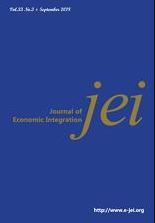A Comparative Analysis of the EU-Morocco FTA vs. Multilateral Liberalization
A Comparative Analysis of the EU-Morocco FTA vs. Multilateral Liberalization
- 세종대학교 경제통합연구소
- Journal of Economic Integration
- 제21권 제3호
-
2006.09496 - 525 (30 pages)
- 0

An applied general equilibrium model with oligopoly and scale economies, based on detailed plant-level data, is used to contrast the impacts of the Morocco-EU free trade area (FTA) to multilateral trade liberalization on Morocco`s economy. Simulation results show that the FTA agreement is likely to have adverse effects on Morocco due to: (a) deteriorating terms of trade, (b) reductions in output per firm in industries dominated by scale economies, (c) diversion of imports away from relatively low cost, non-EU suppliers, and (d) potentially adverse effects on the aggregate demand for labor which could exacerbate already high levels of unemployment. We contrast this FTA with a multilateral liberalization scenario along the lines of those proposed under the Doha Development Round and find this to be more beneficial to Morocco, despite the associated income transfer from the EU to Morocco. The difference may be attributed to: (a) lesser terms of trade losses, (b) positive scale effects, (c) non-preferential liberalization of imports into Morocco, and (d) a positive impact on aggregate labor demand and hence unemployment. We conclude that Morocco would be better off pursuing trade liberalization in the multilateral arena.
Ⅰ. Introduction
Ⅱ. Morocco’s Foreign Trade Patterns and European Union’s Critical Role
Ⅲ. The Applied General Equilibrium Model
Ⅳ. Data and Model Calibration
Ⅴ. Analysis of the EU-Morocco FTA
Ⅵ. Comparison with Multilateral Trade Liberalization
Ⅶ. Conclusions
(0)
(0)